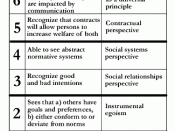The Language of Experience and Development of Relationship
In a Different Voice, by Carol Gilligan, she begins to distinguish between two different modes of moral understanding and two modes of describing the relationship between others and the self. She had noticed the absence of women's voices in previous studies on moral development that focused solely on a hierarchy of maturity through the logic of justice. Understanding the ties between care and responsibility amongst female morality, Gilligan brings into light the missing piece, the activity of care in human development.
These models are presented as different ways of viewing the world; neither is superior or inferior to the other. While care and justice are distinct values, the former need not be seen in sharp contrast with the latter. Justice and care work together, supporting one another at different times and in different ways, all pertaining to the context of the situation.
Gilligan presents this second mode, the care perspective, not to reconcile the two modes, but to emphasize the activity and existence of both. "Recognizing the dual contexts of justice and care, they realize that judgment depends on the way in which the problem is framed."(Gilligan, 167). The clarity and expansion of human development relies on the relationship and connection of both values, through a shift of interpretation in language and thought; by the introduction of the activity of care working alongside the present theory of the ethics of justice.
Proceeding Gilligan's work, Lawrence Kohlberg had performed studies derived from his six stages of moral development, seeing where adolescents fit in his expected trajectory towards moral maturity. Men clearly approached issues with concerns of equality and oppression, while women focused primarily on caring and relationships. The formal and abstract reasoning to address these moral problems favored the masculine conception...


